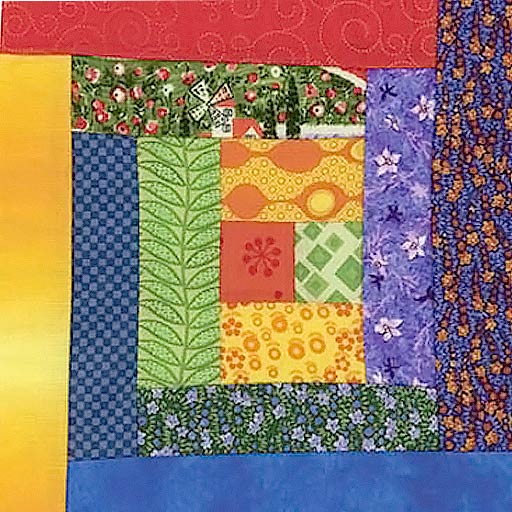“Our life is love, and peace, and tenderness; and bearing one with another, and forgiving one another, and not laying accusations one against another; but praying for one another, and helping one another up with a tender hand.”
Isaac Penington, 1667, Quoted in PYM Faith and Practice, 2002
In Mother Teresa In My Own Words, she tells of bringing rice to a family of eight children who had not eaten for days. The mother accepted the rice, and then divided it in half and went out the door. When she returned later, she explained to Mother Teresa that the people next door had just as many children, and they, too, were hungry. Mother Teresa did not bring her more food that day to make up for what she had shared, but instead waited until the next day. She recognized this mother’s need, despite her own poverty, to give to others, and wanted her to enjoy that happiness.
When we are helping someone who is confined by physical, emotional or cognitive challenges, it is easy to overlook the basic human need to be useful to others. We are so conscious of being helpful that we reject offers of help from the one being cared for, saying “It’s ok, we can do that for you,” or “You don’t need to worry about that.” It may be easier or seem safer to do a task for someone than to allow the time or adaptation needed for that person to do for themselves. Nevertheless, we all need to give, and to feel useful and needed. Our good intentions in protecting someone from stress or absolving them of responsibility may result in that person feeling diminished.
As a new caregiver, I quickly discovered the challenge of following this philosophy of care. Usually I worked daytime hours facilitating programs, but I was required to work in direct care one weekend a month. Weekends in the nursing home were usually short staffed, and we were required to assist anywhere from 8-10 people from bed and through morning routines of using the bathroom, brushing teeth, shaving, bathing, and dressing. Ideally, we were to have this finished within one and one half hours so we could then assist those who needed help eating breakfast. This was much more difficult for me than the challenges of my usual job.
During the day, it could be hard to balance the responsibilities of facilitating a program with the personal care needs of residents. Groups would be interrupted to meet a resident’s more urgent need, such as to use the bathroom. Truthfully, I enjoyed these moments of respite and one on one conversation, and I worked hard to help in a way that was discreet and did not add to the embarrassment of the person in need. This often meant relying on the residents in the group to keep things going for themselves, and I learned to return quietly to enjoy the sense of empowerment the group acquired in my absence. However, morning routines on weekends did not afford the luxury of this approach.
I found it impossible to help people through the morning routine in the allotted time while preserving their self-sufficiency. There simply was not enough time in the schedule to allow adaptations necessitated by cognitive, physical or emotional differences. During the day, process was priority over product in our programs and we made adjustments. However, sacrificing a care task such as brushing teeth or shaving was not an option, so those I cared for and I were always late for breakfast.
One morning, I was trying to help a woman with late stage dementia get dressed. Only half dressed, she decided to quit. She simply sat quietly down. She would not allow me to help her any further. No cuing, no amount of choices, no cheerful invitation “Can I help you with…” would convince her to continue. She had only one shoe on and removed her shirt. If I left her this way, she would likely walk into the hall and I was concerned about her dignity and safety. I stuck my head in the hallway; sometimes a switch in caregivers would help in such a situation. There was no one in sight. I made her bed, busied myself with other tasks and tried again. I held up her shirt; let the open sleeve brush her arms for physical cuing. “Can I help you get this other shoe on? That must be uncomfortable,” got a smile and nothing more. She held fast her arms and kept her unshod foot firmly on the ground. I was aware that I was holding up care of other residents and frustrating my co-workers. The approach to care that I had been taught seemed impossible in this reality, and overwhelmed, I started to cry.
I looked up from my place on the floor by her feet and said, “I need your help.” Her expression changed from apathy to genuine concern. This woman had little ability left to process language, but she was listening to me at another level. I told her I needed to go to the dining room to help another person who could not feed himself; would she please go with me? She seemed to sense that she was needed and the momentum shifted—she quickly responded to my cues and finished dressing.
Later, I felt guilty. I wondered if expressing my need so emotionally was unprofessional. I should have been caring for her; it was unfair of me to unload this burden of my work. Nevertheless, I realized that what happened in our exchange was an allowance of genuine giving. Who gave what to whom? Despite her resistance to getting dressed, her presence was peaceful and serene. Her serenity gave way to allowing me to express myself sincerely—there was nothing artificial in my breakdown into frustration. I gave her my need, something she had not experienced in a while, and she gave me the allowance to care for her. The exchange was reciprocal. I really did need her help.
I never became efficient at the morning routine. This is the reality of staffing for many organizations, and unless that can be addressed, there will always be a tendency for care to be rushed. In those circumstances, it is very hard for a caregiver to meet the level of dignity that is possible when people are encouraged and enabled to care for themselves. I did learn some valuable lessons about independence and interdependence.
Someone might enjoy a shave, having their nails done or getting a haircut as these are things we are accustomed to allowing others to do for us. Rarely have I met someone who felt genuinely accepting of help with the full range of personal care, especially such intimate care as cleaning up after using the bathroom. Gentle, validating kindness helps and empowerment to do what one is able is crucial. Yet, does any approach take away the underlying shame of being unable to do for oneself in a society that fiercely promotes self-sufficiency and independence?
Our lives intertwine like tree roots beneath the ground, together holding the soil and feeding our individual selves. Under the skin of our separate existence is a skeleton that holds us in place. Without the roots, the ground below us crumbles away. Without the skeleton, we are perhaps able to live but unable to get anywhere.
How can we weave the will for independence with the inherent need for interdependence in caring for one another? Can we shed the ingrained need for independence in our self-image?
We could work on this change as individuals, promoting an attitudinal shift to accepting care with grace. However, if independence is such a strong societal value, it seems we also need to make a shift in our interactions with one another. We should support independence of an individual to the degree possible, as this will promote their emotional well-being. What if we also supported and consciously acknowledged one another’s interdependence? By baring our own needs, can we open the door for others to accept care willingly?
Mother Teresa understood how important it was for the mother in that story to give as much as to receive food for her hungry family. In turn, what a gift it was for someone as humble and generous as Mother Teresa to allow someone else the pure joy of giving. This story does not tell us if she had mixed feelings, whether she questioned her decision not to rush back in with more food, or if she had to fight her natural impulses to allow this. It does illustrate her understanding of the value of pure, heart-felt sacrifice, the need we all have to give.
LINKS TO MORE INFORMATION: Click on the blue text below to be directed to outside websites that offer additional information on this topic. Articles from this site will open in the same browser window/tab. Articles from other websites will open in a new window; when you are done, simply click out of that window and you will be back on this site.
More articles on this website:
Allowing Yourself to be Cared For: Autonomy, Interdependence and Interrelationship
Continuity and Coping
Generativity and Aging
Spirituality and Change
Sources/Further Reading:
Mother Teresa, edited by Jose Luis Gonzalez-Balado, Mother Teresa In My Own Words, New York, Gramercy Books, 1996
Ram Dass, Still Here – Embracing Changing, Aging and Dying, 2002, Riverhead Books, New York, NY.

